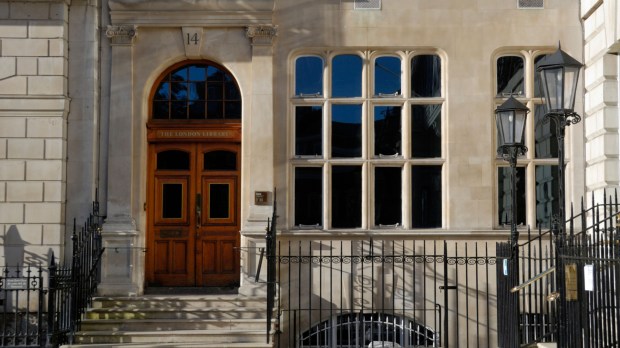The pattern of Israeli/Palestinian conflicts is always forced by coverage into what people call a ‘narrative arc’. The attacks are usually started by Palestinians. They are briefly condemned across the world, but in terms which allow the Israeli response later to be characterised as ‘overreaction’. Thus a sighing Lyse Doucet, for the BBC, edging away from the utter barbarity of the Hamas attacks, said on Tuesday that ‘the rules [of war] are being broken [by Israel in Gaza] in ways they have never seen before’. Is there any other country which, when its civilians – many old or very young – had been massacred or kidnapped in their hundreds at home, would not respond as fiercely as it could? Not to see this is not ‘neutrality’, but moral blindness.
I receive quite frequent emails from an organisation called Stand Up To Racism. This is its latest headline: ‘Anti-racists warn that retreat over the use of hotel for refugee accommodation in Llanelli sets a precedent and will bolster racists and the far right.’ Its ensuing text includes vivid warnings about the return of Nazism. So there just wasn’t room for any mention of Hamas’s murder of more than a thousand Jews.
Mark Carney, former governor of the Bank of England, gives his public support to Rachel Reeves, the shadow chancellor, in a video played for her party conference speech. ‘She is a serious economist,’ he says, ‘She began her career at the Bank of England, so she understands the big picture… It is beyond time that we put her energy and ideas into action.’ This could simply have been avuncular backing for former Bank staff, but I don’t think so. After all, I have never heard Mr Carney praise another former Bank of England employee, Matt Hancock. The timing, placing and content of his words were worked out to maximise Carney support for a Labour election victory. It is unprecedented for a former Bank of England governor to favour a particular party – which is a different thing from supporting (or opposing) a particular policy. It is a bad thing too, for reasons which ought to be obvious. It casts a retrospective light. Mr Carney is in effect impugning his own motives when he was in post.
His is not an isolated case. Another is Sue Gray who, burnished by her former custodianship of Whitehall ‘propriety and ethics’, was a permanent secretary while putting herself in the right position to become Sir Keir Starmer’s chief of staff. Other notables include Sir Keir himself, whose time as DPP was part of his Labour career trajectory, and Lord McDonald of Salford, former PUS at the Foreign Office, who intervened to bring down Boris Johnson over what he had known when about whether an MP had pinched a man’s bottom. Lord McDonald also said publicly that he had told his staff at the time he had voted Remain and that some had been ‘in tears’ over Brexit. In this long-running unelected versus elected row, I am not wholly unsympathetic with the former, since they have sometimes been unfairly criticised by politicians, but these ex-mandarins are scorning the Northcote/Trevelyan tradition of impartiality which they claim (in Lord McDonald’s case, explicitly) to uphold. Don’t they realise their actions bolster Farage-iste accusations of an establishment conspiracy?
A friend’s daughter recently went for a health-giving spa weekend in the country. One service for which she paid was called ‘a forest shower’. This meant going for a walk in a wood and being encouraged to breathe deeply. Such marketing ingenuity reminded me of a Roger the Dodger episode I enjoyed in the Beano nearly 60 years ago. Roger puts up a tent and a notice inviting customers to pay to come in and see the ‘egress’. When they enter, there is a sign pointing out of the tent which simply says ‘egress’. (By the way, the story line shows how sophisticated the Beano was then: no comic strip today would dare assume schoolchildren could work out such a play on words.)
The US Senate has put its foot (leather-clad, I hope) down. In reaction to the non-enforcement (see last week’s Notes) of the previous convention by which male senators wore coat, tie and what Americans call ‘slacks’, it has now introduced its first ever formal dress rule. The row blew up because the 6ft 8in Pennsylvania senator John Fetterman was entering the Chamber wearing a hoodie, shorts and trainers, and the majority leader, Chuck Schumer, let him. Fetterman defended himself: ‘Aren’t there more important things to talk about?’ To which the right answer is surely: ‘Yes, but if you dress that way you make it harder for such talk to proceed respectfully.’ It is pleasingly counter-cultural that the Senate has acted, although it is always sad when low-grade behaviour requires changing convention into a written rule. In the House of Lords, there are no rules of order (including dress), just conventions. One such, mentioned by Andrew Roberts here last week, is that a secular peer should always give way to a bishop wanting to speak. If peers can manage the restraint required to defer to episcopal wittering without any law to force them, surely Senator Fetterman could have managed to put on some trousers.
This is a difficult time for Spectator readers, deprived of their regular cocktail of High Life and Low Life. So it should comfort fans of the latter that my friend and neighbour Robert Bathurst is reprising his one-man version of Jeffrey Bernard Is Unwell. It will be performed on location – at the bar of the Coach and Horses which Jeff propped up. Performances, which are twice nightly but run for only 12 nights, start on 29 October (tickets www.jeffreyplay.com). Robert has posted a trigger warning: ‘The show contains references to Smoking, Gambling, Alcohol and Sex.’ ‘Ah, the Four Horsemen,’ a woman has replied. ‘Bring it on!’
Got something to add? Join the discussion and comment below.
Get 10 issues for just $10
Subscribe to The Spectator Australia today for the next 10 magazine issues, plus full online access, for just $10.
You might disagree with half of it, but you’ll enjoy reading all of it. Try your first month for free, then just $2 a week for the remainder of your first year.















Comments
Don't miss out
Join the conversation with other Spectator Australia readers. Subscribe to leave a comment.
SUBSCRIBEAlready a subscriber? Log in